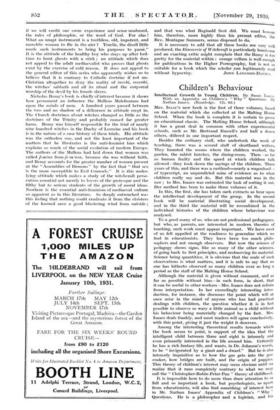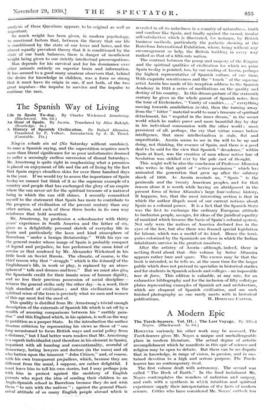Children's Behaviour
Intellectual Growth in Young Children. By Susan Isitata. With an Appendix on Children's " Why " Questions. By Nathan Isaacs. (Routledge. 12s. Gd.)
Isanc's new book is the first of three volumes, based on the material which she collected at the Malting House School. When the book is complete it is certain to prove an educational classic. The Malting House School, although it has a great deal in common with other experimental schools, such as Mr. Bertrand Russell's and half a dozen others, differed in one important respect.
. Besides the ordinary staff, who undertook the work of .teaching, there was a second staff of shorthand writers. They haunted the rooms where the children worked, the garden, the rabbit hutches, the dining-room. Then—so far as human frailty and the speed at which children talk allowed—they took down the sayings of the children. Three years of this, and there was a cartload—nearly a wagonload—. of typescript, an unparalleled mine of evidence as to what children really say and do. But this material was in the raw ; to Mrs. Isaacs was entrusted the task of sorting it out. Her method has been to make three volumes of it.
In this, the first, she has taken such extracts as bear upon the intellectual development of the group. In the second book will be material illustrating social development, and in the third the material will be recombined in the individual histories of the children whose behaviour was analysed.
To a good many of us, who are not professional pedagogues, but who, as parents, are interested in modern theories of teaching, such work must appear important. We have most of us felt appalled at the readiness to generalize which we find in educationists. They have been too much philo- sophers and not enough observers. But now the science of pedagogy shows signs, like so many of the other sciences, of going back to first principles, and reobserving its material. Science being quantitive, it is obvious that the scale of such observations is what matters, and it is safe to say that no one has hitherto observed so many children over so long a period as the staff of the Malting House School.
Although the material is given without comment, and as far as possible without bias—in such form, in short, that it can be useful to other workers—Mrs. Isaacs does not refrain from interpretation. In her exceedingly interesting intro- duction, for instance, she discusses the point which will at once arise in the nand of anyone who has had practical dealings with children, the question whether it is in fact possible to observe so wary a little animal as a child without his behaviour being materially changed by the fact. Mrs. Isaacs deals franidy, and most readers will agree conclusively, with this point, giving it just the weight it deserves.
Among the interesting theoretical results towards which the book seems to point, is support of the idea that the intelligent child between three and eight is intensely and even primarily interested in the life around him. Certainly he has a rich fantasy life, and wants, in Dr. Johnson's words, to be "invigorated by a giant and a dwarf." But he is also intensely inquisitive as to how the gas gets into the gas- cooker, how bridges are built, and the origin of puppies. This theory of children's interest may seem obvious until we
realize that it runs completely contrary to what we noLY call the " Christopher-Robin-Peter-Pan" theory of childhood. It is impossible here to do more than draw attention to so full and so important a book, but psychologists, as apart
from educationists, will also find something of interest here in Mr. Nathan Isaacs' Appendix of Children's "Why" Questions. He is a philosopher and a logician, and his
analysis of these Questions appears to be original as well as important.
So much weight has been given, in modern psychology, to emotional factors that, between the theory that our life is conditioned by the state of our loves and hates, and the almost equally prevalent theory that it is conditioned by the state of our bank balances, there is danger of insufficient weight being given to our strictly intellectual preoccupations. Man depends for his survival and for his dominance over other animals entirely on superior brain and information. It has seemed to a good many amateur observers that, behind the desire for knowledge in children, was a force so strong that it must have its origin in one, if not both, of the two great impulses—the impulse to survive and the impulse to continue the race.











































 Previous page
Previous page